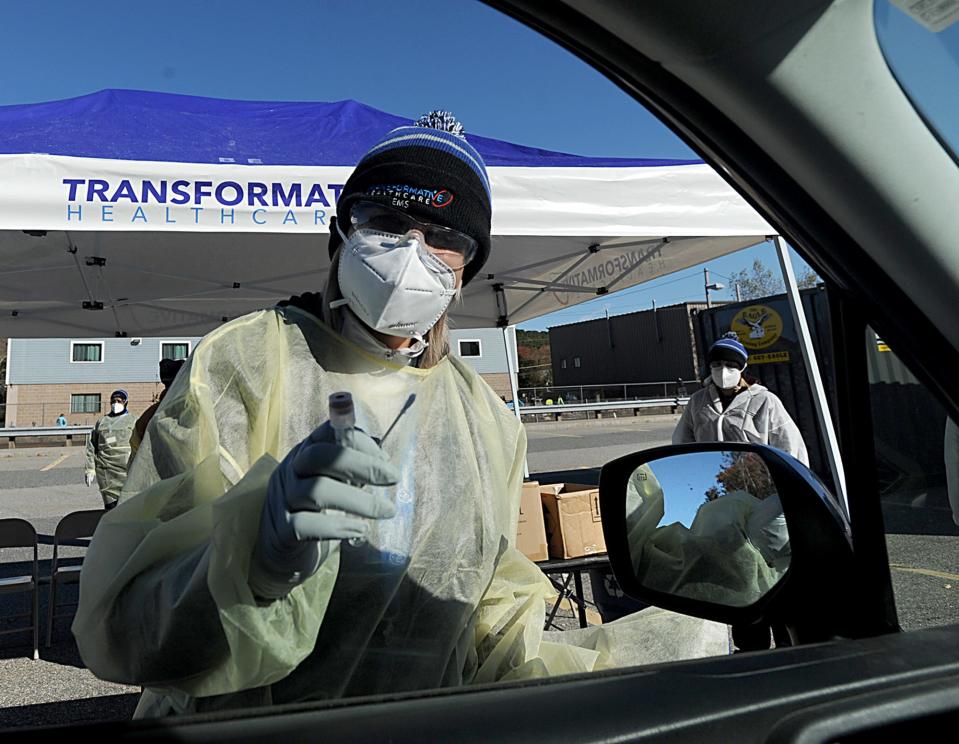Doctors expect a COVID-19 ‘tidal wave' for holidays. Who’s getting sick?
- Oops!Something went wrong.Please try again later.
You may be spreading more than holiday cheer this winter.
Doctors are predicting a spike in COVID-19 cases as the holidays get underway, though “tidal wave” may be more accurate, according to Dr. Michael Connors, physician director of Urgent Care at Milford Regional Physician Group.
“Nothing spreads viruses (including COVID-19) better than bringing people together from various parts of the country to gather indoors,” he said.
Already, doctors are seeing an uptick: Middlesex County reported 117 more cases last week than the week before, while Worcester County saw 433 more cases from week to week, according to USA TODAY.
More: Number of new COVID-19 cases rises 8.7% in Massachusetts
Yet 73% of Middlesex County residents are fully vaccinated, as are 64% of the population in Worcester County, according to the Centers for Disease Control and Prevention.
So, who’s getting sick?

Vaccinated, but not boosted
Statewide, children between the ages of 5 to 14 years old had the highest case rates over the two-week span from Nov. 7 to Nov. 20, according to the most recent data available from the Massachusetts Department of Public Health. Pediatric vaccination efforts were just beginning then, and children had the lowest rates of COVID-related hospitalization among all age groups during those two weeks.
Pediatric vax rollout: Which MetroWest community has the highest vaccination rate?
Milford Regional Urgent Care has seen fairly mild symptoms among younger COVID-19 patients, though some occasionally have serious symptoms that require a trip to the emergency room or hospitalization, according to Connors.
“Most of the COVID cases we are seeing in Urgent Care are younger — under age 40, the majority unvaccinated,” he said.
Dr. George Abraham, chief of medicine at St. Vincent Hospital in Worcester, reported similar trends.
“New cases of COVID-19 are still mostly among the unvaccinated,” he said. “We’re also seeing some cases among those who are vaccinated but have not yet received a booster.”
Connors said the COVID-positive vaccinated individuals he’s seen have largely been six months post-vaccination. Studies have shown vaccines’ effectiveness begins to fade six months after initial doses, and the CDC now recommends booster shots for all adults.
What to know: COVID booster shots are now recommended for all American adults
Data from the DPH shows that only 1.6% of fully vaccinated individuals have tested positive, and 0.05% have required hospitalization as of Saturday.
“We are seeing better outcomes because of vaccines and progress in the treatment of COVID-19,” said Abraham, who is also president of the American College of Physicians. “On average, we are seeing much milder disease, along with earlier and quicker discharges.”
Treatments that help: Milford Regional offers monoclonal antibodies to help fight COVID-19
What should you expect this holiday season for COVID cases?
Still, local hospitals and medical centers have already seen an uptick in cases.
“Our percentage of positive tests is almost double last year’s percentage at this time,” Connors said. “The upside is that with vaccines and more young people positive, the hospitals in our area are not as inundated as we were last year.”
Abraham was similarly optimistic.
“Given increased vaccinations and, hopefully, persistent masking, we expect this season to be better than last year in terms of lower number of cases and illness,” he said.
More cases put added strain on a health care system already facing critical shortages of ICU beds and staff.
No ICU beds: Boston MedFlight's operations severely impacted by capacity, staffing crisis
COVID-19 surges impact care in a variety of ways, Connors said.
“Firstly, patients should expect to experience long delays," he said. "Urgent care centers and ERs are taking care of so many COVID patients that patients seeking care for other health issues inevitably have to wait longer."
The sheer volume of patients is also stressful for providers and staff, he added.
“In fact, some have left health care since the pandemic began and we are finding it very difficult to hire people to work in health care at this time,” Connors said. “We are asking people to be patient, due to our ongoing staffing challenges.”
Dr. Vibha Sharma, chief of infectious disease at UMass Memorial Health – Marlborough Hospital, reported similar conditions.
“Providers are tired, exhausted, and we have (a) critical shortage of work force,” she said. “Wait times, bed availability will be challenging.”
The Baker administration recently ordered hospitals that don’t have at least 15% available capacity to scale back non-urgent procedures.
How can you protect yourself from COVID-19?
“With most urgent care sites currently experiencing exceedingly high volume and longer wait times due to COVID-19, the best thing to do first is contact your primary care physician (if you’re not feeling well),” Connors advised.
What about the newly detected omicron variant? Much is still unknown about the variant’s transmissibility, severity of symptoms and interaction with existing COVID-19 vaccines, as USA TODAY reported.
According to Sharma, omicron is highly contagious and a variant of concern, but it’s difficult to predict how the variant will play out in the future.
“There is no reason to panic about the omicron variant,” Abraham said. “Getting (a) vaccine (for those who have not gotten it), getting boosters (for those already vaccinated) and continuing to mask, distance, and wash hands is critical to ongoing public health.”
Abby Patkin is a multimedia journalist for the Daily News. Follow Abby on Twitter @AMPatkin. She can be reached at apatkin@wickedlocal.com.
This article originally appeared on MetroWest Daily News: MetroWest is highly vaccinated, but COVID-19 cases continue to rise

